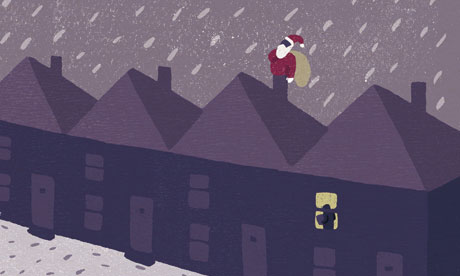
Even though I don't work in an office these days – I like it that way, mainly, though I've yet to discover how to steal Post-its from myself – the pre-Christmas atmosphere of the modern white-collar workplace is so all-permeating it seems to seep from nearby buildings into my brain. This liminal time, when work has largely stopped but holidays haven't begun, is as familiar a part of the season's emotional weather as the tingle of Christmas Eve, the post-dinner haze of the 25th, or the murderous rage provoked by The Little Drummer Boy's opening notes. Yet the strange thing is what happens to my productivity when everyone stops trying: suddenly, I get loads more done.
Partly this is just the usual pre-holiday burst of motivation to tie up loose ends. But it's also the flipside of an argument the author and entrepreneur Jason Fried made in a recent TED conference talk pithily entitled Why Work Doesn't Happen At Work (it's online at bit.ly/eFbNqU). The office, he contends, is "optimised for interruption" – not the minor, voluntary interruptions of Facebook or amusingly captioned photographs of cats, which are just "modern-day smoke breaks", but the huge interruptions we've come to mistake for work, which Fried calls "M&Ms": managers and meetings. Ask people where and when they get real work done, he notes, and they'll say early in the morning, before anyone else arrives, or when everyone's gone home, or at home, or while travelling. The very mechanisms of the workplace obstruct work itself, which gets pushed to the margins. In the run-up to Christmas, by contrast, meetings stop, managers relax, the phone stops ringing… and (in my experience, anyhow) stuff can finally get done.
Recently, I attended an "unconference" based on the principles of Open Space Technology, a vaguely new agey philosophy for running conferences designed to address the curious truth that the margins are often where the best things happen. Its inventor, the American consultant Harrison Owen, grew frustrated at organising major events, only to find the most meaningful discussions always happened during coffee breaks. OST attempts to replicate the relaxed energy of a coffee break throughout an event; unlike traditional gatherings, participants choose the topics, and are instructed to follow the "Law of Two Feet": if you lose interest in a conversation, leave it. The result was slightly shambolic, but infinitely more spirited than the usual conference torpor, a constantly recombining network of coffee breaks, all useful margin with no useless centre.
That works only for conferences, of course; for day-to-day work, Fried argues, we need more uninterrupted time. (He has a vested interest: his firm sells chat software designed to eliminate meetings.) Then again, don't "useful margins" derive some of their special quality from the contrast with non-margins? Isn't an early-morning office so conducive to work partly because it'll later get noisy? I work best on trains, and have half-seriously considered trying to do so for days at a time. But it wouldn't work. After a while, I'd invent new interruptions. Damn, but human nature is irritating. Merry Christmas.
oliver.burkeman@theguardian.com
twitter.com/oliverburkeman
• A collection of Oliver's columns, Help!: How To Become Slightly Happier And Get A Bit More Done, is published on 6 January by Canongate Books at £12.99. To order a copy for £10.39 (including free UK p&p), go to guardianbookshop.co.uk.

